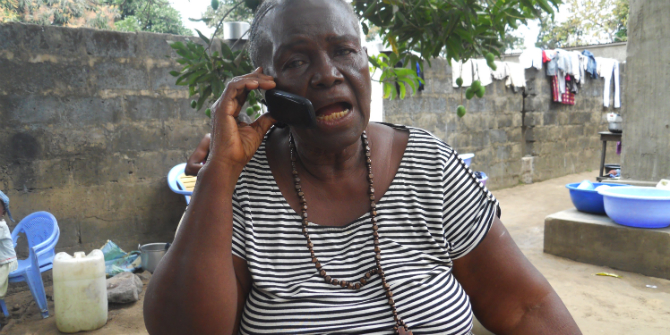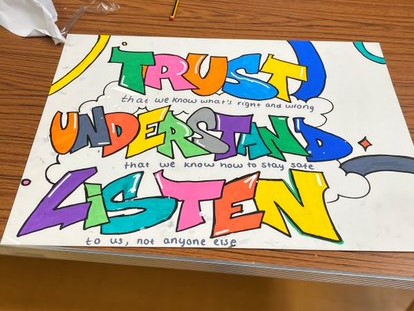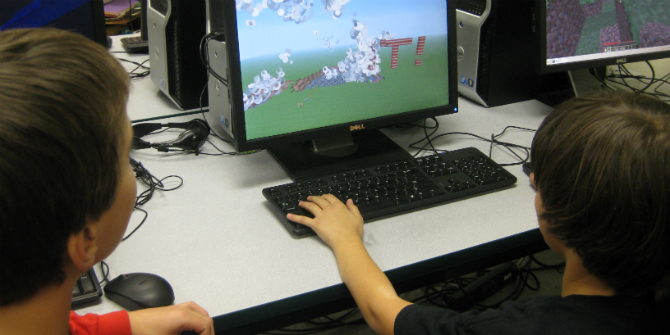 What kinds of access do elderly people in Kinshasa (DRC) have to new media, and in particular, to mobile phones? Surprisingly, instead of children providing their elderly parents with such devices, it is grandchildren who facilitate access, but sometimes in troubling ways, finds Katrien Pype. She is an anthropologist at the Institute for Anthropological Research in Africa at KU Leuven University and a Fellow at the Department of African Studies & Anthropology at the University of Birmingham. Katrien is interested in how people make sense of communication technologies in their daily lives and how it impacts urban lifeworlds.
What kinds of access do elderly people in Kinshasa (DRC) have to new media, and in particular, to mobile phones? Surprisingly, instead of children providing their elderly parents with such devices, it is grandchildren who facilitate access, but sometimes in troubling ways, finds Katrien Pype. She is an anthropologist at the Institute for Anthropological Research in Africa at KU Leuven University and a Fellow at the Department of African Studies & Anthropology at the University of Birmingham. Katrien is interested in how people make sense of communication technologies in their daily lives and how it impacts urban lifeworlds.
I conducted ethnographic research in Kinshasa, Democratic Republic of the Congo (DRC), between 2011 and 2014, looking at how elderly people in African cities experience mass media such as radio, television and mobile phone technologies¹. I show how mobile phones in particular (tshombo in informal Lingala, the language in Kinshasa) have become key objects that differently mediate the relationships both between adjacent (parents and children) and alternating (grandparents and grandchildren) generations.
Mobile phones as devices for caring
In the Democratic Republic of the Congo, providing a mobile phone is a major part of caring for the elderly, and failure to do so could lead an elderly parent to consider his or her child as ‘a bad child’. Especially, but not exclusively, the adult children are expected to provide their elderly parents with a mobile phone and with phone credit.
I interviewed a fairly elderly woman who repeatedly complained that her children were not taking good care of her because they had refused to give her her own mobile phone. She had spent most of her life in Kikwit, a city approximately 400km southeast of Kinshasa, where her favourite son still lived; his other two siblings had set up a household in Kinshasa. A few years ago, her three children had decided that, because of the better medical infrastructure in Kinshasa, it would be better for her to live in the capital, even though she longed to be back in Kikwit. Knowing that this was not an option, she felt that at least speaking daily with her son would give her some comfort. Although she was allowed to use the mobile phones of the children she was living with, she was not satisfied and wanted more autonomy in her mobile conversations.
Her three children, however, claimed that she spoke enough times with her son in Kikwit, and the latter also felt emotionally burdened by these telephone conversations, which seemed to him to be mostly complaints, accusations and expressions of a desire to die. The children agreed not to give their mother her own handset. The mother then interpreted their refusal as lack of care, and voiced it as such during conversations with strangers (me included), thus seriously embarrassing her children and their partners.
This illustrates how mobile phone technology has come to mediate belonging among generations in a double sense – the mobile phone not only facilitates connections or contact between parents and their offspring/caretakers, but the mobile phone in its material form also indexes the relations that the device is supposed to mediate.
Grandchildren as ‘surrogate users’
The elderly are not always the only ‘users’ of these (donated) mobile phones. Rather, very often these tshombo arrive in the hands of their grandchildren, with whom they stand, symbolically, on an equal level.
Grandchildren and grandparents share strong affective ties, in contrast to the rigour, discipline and emotional distance that often structures relations between parents and their children. In alternating generations, affection and banter dominate. This relationship between grandparents and grandchildren is first and foremost linguistically performed: in the many languages of the DRC’s ethnic groups, the same word is used to indicate a grandfather/grandmother and grandson/granddaughter – koko.
The identification between the various bakoko (plural) is related to cultural perceptions of the social reproduction of the ethnic group (the social unit that is defined by blood relations). This symbolic identification also feeds into social behaviour, influences notions of ownership and structures the exchange of objects differently compared to the interaction between adjacent generations.
Grandchildren will often use their grandparents’ phones without asking. However, the elderly will mostly turn towards their grandchildren to find phone numbers, send and read text messages, and sometimes even to help with or have phone conversations.
These observations suggest the importance of ‘surrogate users’. Elders are active participants in the mobile phone culture, but oftentimes by proxy because of the intervention of their grandchildren, who act as surrogate users – actually dialling the phone numbers and/or even having the conversations on behalf of their (classificatory) grandparents.
These observations are not unique to Kinshasa. Research in Lisbon has also shown how intergenerational relationships mediate the use of ICT: grandchildren encouraged the elderly to adopt new technologies, while friends and younger family members would use the Internet and the computer for them (‘faux users’ according to Neves and Amaro 2012).
Sun Sun Lim discusses these ‘power asymmetries’ in Singapore. Yet the socio-cultural parameters that orient these dynamics are different. In Kinshasa, the identification between the alternating generations (grandparents /grandchildren) is one of the various cultural reasons (others are ‘bigmanity’ and the performance of respectability) that push the elderly to insert go-betweens in their mobile communications.
Unity and harmony vs. tension and conflict
Although there may be benefits in bringing together grandparents and grandchildren in this shared use, in a contemporary megacity such as Kinshasa, reigned by a fend-for-yourself economy (économie de la débrouille), mobile phone usage by proxy often leads to tensions, conflict and lack of trust when the grandchildren take advantage of the cultural license to use someone else’s handset and phone credit.
Grandchildren are given control over the mobile phone, are often more media literate than their grandparents, and thus can spend their grandparent’s phone credit on other conversations, or worse, sell the handset for their own benefit. For example, when Patrick, a 16-year-old boy, sold his grandmother’s mobile phone to one of his friends, he first lied and said that the phone had been stolen. When she recognised her own tshombo in the hands of one of the youth that would visit the compound frequently, she understood what actually had happened. Though, she did not comment on it, nor did she ask for her phone back. Her resignation to claim what belongs to her should not be read as a general reaction. I have seen a few instances on which theft of phone credit was followed by insults, threats (of witchcraft) and urgent demands for reimbursement. The consequence was that these young people would think twice before selling goods of their koko.
These observations demonstrate the nuance of the social dynamics in Kinshasa’s mobile phone culture. They remind us how mobile phones steer relationships across the generations – at times, it establishes and/or maintains unity and harmony; at other times, unfulfilled expectations or undesired usage of mobile phone technology instills discord, stress and conflict. Furthermore, this sheds new light on how the elderly inhabit electronic modernity. Although there is increasing interest in the use of mobile technology by older people, especially relating to their health, ethnographic research examining the beliefs, practices and social relationships of technology for older people is still rare, even in the West.
NOTES
¹ Specifically, I looked at how their participation in these new media worlds is influenced by the ways in which they negotiate access to and consumption of media content and objects. I have written more on this in the chapter ‘Brokers of belonging: Elders and intermediaries in Kinshasa’s mobile phone culture’, which will appear in From audiences to users: Everyday media practices in Africa, edited by Wendy Willems and Winston Mano, to be published by Routledge in 2016.






